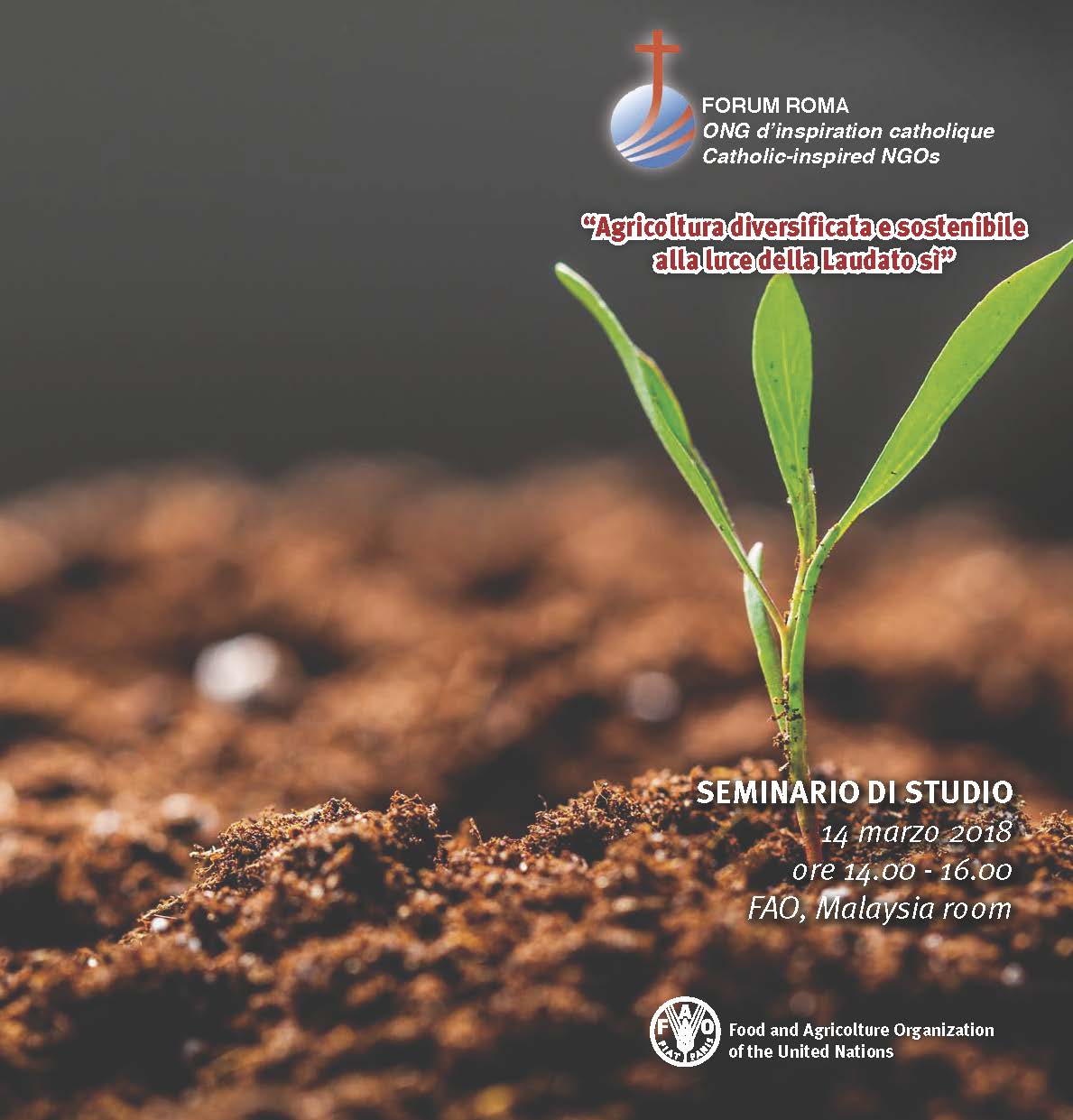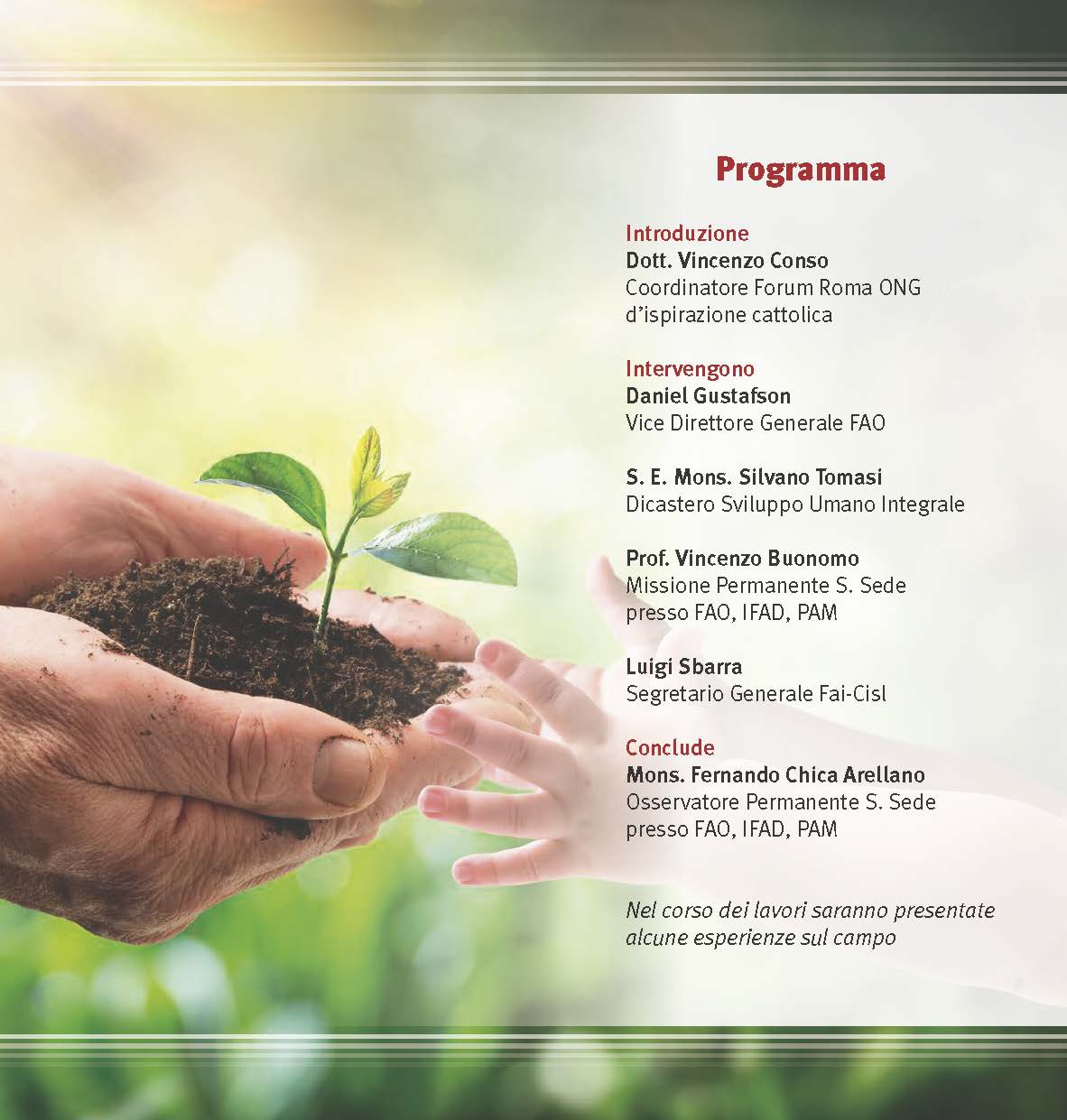On March 14, the “Diversified and Sustainable Agriculture in the Light of the Laudato Si” seminar organized by the NGO Forum of Catholic Inspiration in Rome took place at the FAO headquarters; Social Promotion Foundation is a member of it Executive Committee.
The introduction of the seminar was made by Vincenzo Conso, coordinator of the Forum of Rome. The seminar counted with the interventions of Daniel Gustafson, Deputy Director General of FAO; HE Mons. Silvano Tomasi, of the Dicastery for Integral Human Development; Prof. Vincenzo Buonomo, Permanent Mission of the Headquarters to FAO, IFAD, PAM; and Luigi Sbarra, Secretary General of FAI-CISL. Fernando Chica Arellano, Permanent Observer of the Holy Seed before FAO, IFAD, PAM, made the conclusions of the seminar.
Daniel Gustafson argued that the encyclical is very important because it gives us an in-depth idea of the challenge that characterizes our era; renewing the best tradition of the Catholic Social Doctrine that always identified and requested answers to the central question of all times, beginning with “social justice” with the Rerum Novarum of Leo XIII (1891).
Today, this challenge is the “environmental issue” that, indissolubly linked with the “integral human development”, leads the Holy Father to talk about integral ecology. It is a compendium of information, analysis and considerations that link the issues of climate change with those of food security (FAO) and the fight against poverty. Issues that the international community is trying to address with the “Climate Agreement” approved in Paris in 2015 and with the objectives of the “2030 Agenda for Sustainable Development”.
Bishop Silvano Tomasi also underlined that the center of this commitment can be defined by the will to look at the environment and human development without anyone and nothing being left behind, and then look concretely at the person and the planet where the problems and solutions are always connected.
A market capable of responding to the “ethical” dimensions (ethical market) is necessary. The encyclical highlights and criticizes the relationship between a certain type of technological innovation and the manipulation of the market that is not capable of solving problems. This international debate is promoted to provoke a cultural change against lack of political will.
In this context, a “diversified agriculture” is essential for sustainability, according to the indications developed to achieve food security and the fight against poverty in rural areas, and that have underlined the central role of transforming family farming in order to respond to all these challenges, creating a new economy whose foundation is human beings.
Lugi Sbarra also agreed with these arguments, he recalled that we have to consider the land as a loan from our children, that in the agri-food sector we can only talk about development if it is sustainable, because otherwise it is not a true development, and finally, that an inter-generational pact is necessary at the territorial and national levels.
During the debate it was underlined that much is said about sustainability, but that it exists mainly at the theoretical level in books; currently, there is a lack of policies and financing to be truly effective. Similarly, despite having resources and technologies to solve the problem of hunger, this issue not only remains unresolved, but malnutrition has increased, and conflicts are multiplying, making dramatic many situations.
Bishop Fernando Chica Arellano concluded the Seminar by defending the need to maintain a realistic attitude, and consequently evidenced how the challenge of the “2030 Agenda for Sustainable Development” is already lost, despite the existence of adequate responses and resources, There is an authentic will to implement them. In fact, no agreement has been found to finance development through the 17 objectives and the 196 sub-objectives. However, we must not only look at the things that have not worked and their risks: in effect, a cultural reaction has been activated that translates into numerous works, which are clearly identifiable thanks to the dissemination of good practices and the realization of micro projects that demonstrate a capacity for action “from the bottom up”. Consciousnesses are needed that are formed, and not only informed, to build these works with many bricks, which are also an example of the importance of our life in this world. Msgr. Chica thanked the Forum of Rome and its coordinator, because they are a precious help to continue this commitment.








